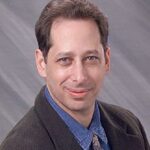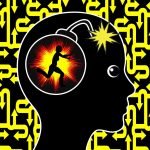Helping Patients With Psycho-Spiritual Dilemmas
Shandor Weiss, ND, LAc
Psycho-spiritual dilemma (PSD) is a term I use to describe pathological, non-resolving stresses that include both psychological and spiritual aspects of being. A dilemma is any situation with no apparent solution. PSDs are dilemmas of the mind, caused by dualistic thinking. In fact, all thought is dualistic. Like computers, the brain operates with a binary system. Through thinking, the mind separates and compares two possibilities: It creates object and subject, I and you, this and that, good and bad, pure and impure, and so on. Usually, a balanced mind will bounce back and forth between the two poles of duality, and finally choose one of them. This settling process then leads to opinions, beliefs, prejudices and actions. These mental phenomena may be beneficial or harmful, but the process itself is normal and adaptive.
A dilemma is created when the mind is confronted with two mutually exclusive options at the same time and cannot choose between them. Often, the conflicting experience is between the right and left sides of the brain. For example, we may receive one message through verbal information with our left-brain cognitive functions. At the same time, we receive contradictory information with our right-brain perceptions of body language, tone, gestures, cadence, inflection and affect. What is communicated with words does not match what is communicated without words. Gregory Bateson, in Steps to an Ecology of Mind, called this condition the Double Bind. He felt that double binds were the cause of many modern mental diseases.
Attachment or grasping to mental phenomena perpetuates the two poles of a dilemma. The attachment may be to a belief, opinion, memory, view, paradigm, emotion, wish, desire or other mental phenomena. Dilemmas may also be created and perpetuated through a lack of information, confusion, perversity or habitual tendencies. However they arise, once a dilemma is created in the mind it tends to stay there. A therapeutic intervention is then needed to break the cycle. Fortunately, NDs have many tools that help dissipate dilemmas.
Dilemmas of the mind become psycho-spiritual when a person’s psychology conflicts with religious or spiritual issues. Since human beings are basically spiritual beings, virtually all mental dilemmas are also PSDs. Even from a materialistic or non-spiritual view, we are spiritual beings. Our biological name, Homo sapiens, means “human aware of itself.” This self-awareness evolved at the same time that religious beliefs, behaviors and artifacts arose in human evolution. The capacity to think leads to thinking about issues such as life and death, and what happens after we die. Most anthropologists agree that the distinguishing characteristic in the evolution of Homo sapiens is the belief in an after-life. From this belief, all forms of religion and spirituality eventually developed. Whether or not an individual alive today believes in an after-life, the point is that we can and do think about such things. In fact, it is my experience that PSDs are the biggest source of stress that human beings experience.
Here is my list of the most common types of PSD syndromes:
- Finding one’s life
- Damned if I die
- Too busy to die, or controlling life to avoid death
- Materialist/atheist depressed about death
- Prayer without faith, or I’m not worthy
- Wrath at God guilt
- Pre- or trans-incarnational post-traumatic stress
- Inquisition persecution complex, or fear of spirituality
- Ready to go “home” but not gone yet
- Purging or bowel cleansing due to feeling impure, unclean or guilt.
Finding One’s Life Syndrome
The most common PSD is whether people have found their life … or not. I know this has been true in my own life. Ever since I can remember, I was constantly wondering what life was about, and what I would do with my life. After leaving undergraduate school, I encountered a psychic who told me a “spirit guide” was telling me, “You must follow the Nature Path.” Unfortunately, neither the psychic nor I knew that a naturopath was a type of doctor. It took me nine more years to find my way to naturopathic school.
Soon after that chance encounter with the psychic, I moved from the East to West Coast. Along the way I was “led” to stop in Pine Ridge, SD, which is on a Sioux Indian reservation. As soon as we got out of the car, my traveling companion and I met a woman on the sidewalk. She asked us a series of questions, as though she was testing us. Then she said, “Get in your car and follow me. I want you to meet someone.” The woman drove to a residential area, and we followed. She stopped at a nice, ranch-style home and went in. We followed her. The owner was hosting a poker game with about 10 other Native Americans, who were smoking cigars, drinking beer and gambling. The host, a huge, gregarious man, invited us to sit next to him at the table. He asked poignant questions and made jokes that indicated he was psychic. When it came time to leave, he stood up to shake hands goodbye. Towering over me, and leaning forward, he bellowed, “You must find your life!” I was shocked, and meekly said, “What?” “That’s right,” he continued, “You must find your life!” His words almost knocked me over. Then he added, “And remember, Red Cloud’s grandson told you that.”
Red Cloud was the most famous Sioux chief, warrior and medicine man of the 19th century. I have a copy of an Edward Curtis photo of him in my office. Patients often ask who it is, or why I have it there. Usually I tell the story of meeting his grandson, and the importance of finding one’s life. I explain that this means discovering one’s purpose. I go on to say that there are two kinds of purpose: The first is Purpose, with a capital “P,” which is the same for every human being: finding the Meaning of Life. Surprisingly, many people are either unaware that there is such a thing, or they have an erroneous idea of what that Purpose is.
Not consciously knowing the Purpose of Life is such a huge stress because we intuitively or subconsciously know there is a Purpose. Therefore, not knowing creates a dilemma between the conscious mind or intellect and the intuitive and/or subconscious mind. The dichotomy of not knowing creates a source of stress that permeates a person’s whole life.
While it is imperative to acknowledge the existence of Life Purpose, it is also important not to impose the doctor’s own world view or spiritual beliefs on to the patient. At the same time, it is important to acknowledge spiritual realities. This is the doctor’s dilemma. In my practice, I usually don’t tell a patient what the Purpose of Life is. I just tell them that there is such a thing, and that it is up to each of us to discover it. If they are religious or have an object of faith (i.e., a spiritual path), I ask them what they think it is, and if they have found it. I ask them to use their own beliefs to clarify or define the Purpose of Life. If I feel their answer is incongruent with their own religion or belief system, I try to help them use their own beliefs in a more logical way.
Given that there is a single Purpose in life that is the same for everyone, how do we live our lives in accordance with that Purpose? The second kind of life purpose(s) (with a small “p”) addresses this issue. These purpose(s) are unique for each person, and can include career, service, teaching, creativity, invention, art, protection, marriage, family, children, influencing others, and personal or spiritual development. People often go through stages of finding and fulfilling life purposes. The process can be like following a treasure map: one goes from clue to clue, getting closer as the map of life unfolds.
The pursuit of one’s purpose(s) is somewhat of a modern concern. In traditional cultures, people did not have choices or options, so they didn’t question their lives. As Tevia says about tradition in Fiddler on the Roof, “We know who we are, and what God expects from us.” Those who have found the answer(s) to both kinds of purpose are the most fortunate people. They are more content, calm, successful and well. Those who have not suffer, either from searching and not finding, or from the futility of life without searching or finding their Purpose. The lack of knowing the Purpose of Life and one’s purpose(s) in life creates a dilemma in every patient. Without a sense of purpose, patients have a sense of discontent that permeates their lives. This lack of knowing leads to poor choices in lifestyle, health and behaviors. As holistic doctors, we can help patients immensely by helping them discover their life purpose(s) as a fundamental step in the path of healing.
There are many ways to help someone find their purpose(s). There is prayer. There are self-help books, seminars and programs. There are vocational counselors and therapists who specialize in this area. Intuitive counselors (i.e., psychics) and astrologers can help. Religious leaders and spiritual teachers are a good source of guidance. As a doctor, I often start by asking the patient what they wanted to do as a child. People often had a dream or vision of their purpose when they were young, which faded as they grew older. In my practice I also use Electrodermal Screening (EDS), also known as Meridian Stress Assessment (MSA) or Electroacupuncture According to Voll (EAV), to assist each patient in finding their life purpose(s). I ask how many there are, how many have already been fulfilled and then what they are. I start with broad categories, and then narrow it down with yes or no questions. I also check to see if it is appropriate to find purpose(s) in this way. Sometimes it is better for the patient to discover them on their own. On the other hand, many of my patients have made major life changes based on the work we’ve done together.
Damned If I Die Syndrome
In the Damned If I Die Syndrome, patients feel they will go to hell when they die. This PSD afflicted a woman in her 50s who came to see me. She had advanced breast cancer. The doctors gave her a few months to live. Upon telling me of her case, the woman threw up her arms and said, “I CAN’T die! I have sinned so much, I know I am going to hell as soon as I die. Doctor, can you save me?”
This case demonstrates the main problem in PSDs: There is a lack of consistency between the patient’s belief system and their personal beliefs or feelings. Truly, anyone with a basic knowledge of Christian beliefs could help this patient … if she had trust or faith in them. It just requires the use of logic, like this:
Doctor: “So, you are a Catholic?” (This is on the intake forms.)
Patient: “Yes.”
Doctor: “Do you believe in the teachings of Jesus Christ?”
Patient: “Yes.”
Doctor: “Well, don’t those teachings say that He died on the cross for your sins?”
Patient: “Yes.”
Doctor: “So, you have nothing to worry about. When you die, whenever that is, your sins will be forgiven and you will go to Heaven. Right?”
At this point the patient may or may not say “Yes.” But the strategy is to keep asking simple questions to which the patient has to answer yes or no according to their belief system. Then you will discover the real issue or obstacle. In this case, the patient agreed with the last question, but went on to say that she herself would not be forgiven, because she was unable to forgive someone who had wronged her. At this point, I suggested that even not forgiving could be forgiven. Then I gave her a flower remedy and urged her to talk to a priest.
Too Busy to Die, or Controlling Life to Avoid Death Syndrome
We all know patients who are so busy they don’t take time to rest, sleep, take medicines, exercise and so on. Such busy people also tend to be controllers: They try to control other people, themselves and events. They may also be hedonists. These people suffer from the Too Busy to Die Syndrome, or its corollary, the Controlling Life to Avoid Death Syndrome. In both cases, a fear of death underlies the behavior. They think or feel that they can cheat death by being too busy to die, or by controlling everything around them. Often, they are wealthy or “successful” business people. They try to amass wealth as a protection from death. This is obviously a dilemma, because they know that everyone does die, sooner or later.
I had a patient who was a retired police officer. He had developed angina, high blood pressure, insomnia and depression. I asked him if he was afraid of death. First he said no. He had been in many dangerous, potentially deadly situations as a policeman. Then I told him a story about how I thought I was not afraid of death, until one day something happened that really scared me. The patient thought for a moment, and then recalled that his symptoms started soon after he was shaken by an earthquake. That scared him because it was a power beyond his control. Being shot at did not scare him, because he thought he was in control of the situation. Just by talking about the issue, he started to recover. Then I suggested that he create a five-year plan for setting goals. This helped him to recover totally, because it empowered him to feel in control of his life again. I just gave him healthy ways to channel the need to control.
Another treatment strategy includes discussing the inevitability of death, and the futility of avoiding it with behaviors. Since such patients are often business people, it may help to direct them towards adopting a warrior’s ways as a business strategy. There are numerous books on this subject, but the basic idea can be easily explained: The soldier or warrior takes the attitude that their life is already over. It is just a matter of time before they are killed in battle; they are living on borrowed time. And we all are, if we see it that way. This view allows us to fight more effectively, without the fear of death. The warrior makes friends with death and uses it as an ally, for death gives him courage and strength. Acceptance of death makes the warrior – and the overbusy, controlling, driven patient – more likely to succeed. If patients can be convinced of this fact, they may be able to turn around their fear … and their behaviors.
Another strategy to help patients with faith is to help convince them of the beliefs of their faith. If they believe in going to heaven, then help them feel that they will go to heaven, according to the teachings of their religion. If the patient believes in reincarnation, then tell them that going from one life to another is like waking up from a dream: We are still the same person who went to sleep the night before. When the spiritual master, Ven. Chogyam Trungpa Rinpoche, was “dying,” to comfort a distraught disciple he said, “Don’t cry … nothing happens!” (personal communication, n.d.) He meant that with awareness, there is no loss of consciousness going from one life to another.
Materialist/Atheist Depressed About Death Syndrome
There are many PSDs concerning death. Another is the Materialist/Atheist Depressed About Death Syndrome. An elderly patient with this problem had been depressed most of his life. As time went on the depression intensified. He had tried various antidepressants without improvement. Psychotherapy had not worked. After a long interview, I learned that he was depressed at the idea of death. He felt it was horrible that he would just “disappear” into nothing. He had no beliefs about an afterlife, soul, spirit or reincarnation. Technically, this is termed a materialistic worldview. I pointed this out to him, and told him that the source of his depression was a fear of death without faith in any kind of afterlife or immortality of the soul. I asked him if he might be able to adopt some sort of spiritual view or tradition. He got very upset with me, saying that he absolutely could and would not. He wanted a pill to make him better. I told him there was no pill to fix his problem, but that he could try to resolve it by adopting a natural view of life. He could think of himself as a part of the cycles of nature, in which all living beings die, but are part of a greater force or process that goes on. This is, in fact, the ecological model of life. Unfortunately, this did not appeal to the patient, either. He decided to seek help elsewhere, and I was unable to help him resolve the dilemma.
Prayer Without Faith Syndrome
A case of the Prayer Without Faith Syndrome presented as a woman in her 60s, who suffered from environmental illness and chronic fatigue. She also had various pains that came on when she was anxious and stressed. This patient was a devout Christian. She prayed throughout the day to reduce her anxiety. But what did she pray for? How did she pray? I ask my patients these kinds of questions. I also ask what her denomination’s teachings are about prayer. My goal is to find a way that she can have consistency within her own faith and religious or spiritual path. As it turned out, she prayed “correctly” from an outer perspective, but she didn’t believe she was worthy of God’s love, and so she felt her prayers would not be heard or answered. Yet she still prayed! What a dilemma! I helped her resolve it by asking things like, “Doesn’t God love everyone equally?” She nods her head, yes. “So, if that’s true, then aren’t you one of those who are equal to everyone, whom God loves?” Another nod, yes. “OK, then doesn’t that mean that God loves you, too, and will hear and respond to your prayers?” She answers, “Yeah, I guess so…” At this point, the dilemma is revealed, but not resolved. The patient is mouthing the words, but it has not sunk in. I wrote down an affirmation, duplicating what we had just discussed, and asked her to repeat it at least a dozen times before and after praying. I also asked her to pray for God’s help in resolving this issue.
Wrath at God Guilt Syndrome
The Wrath at God Guilt Syndrome is a common dilemma that arises after a loss: death of a loved one, damage from disasters, disease, financial ruin and so on. People who believe in God get angry at God for either causing the problem, letting it happen or not answering prayers to be protected, healed or saved. It is an emotional response in conflict with rational beliefs, or it is based on incorrect beliefs, such as “God makes us suffer.” Some people are in denial about their anger at God, while others are fully conscious. It may even cause them to leave their faith.
Helping a patient with this PSD requires two tactics: logic and emotional healing. The anger has to be dealt with one way or another. I like to use flower essence formulas that also contain homeopathic remedies. But almost any therapy can help, including time. The anger is a part of the grieving process. Pointing this out to the patient may also help. The other tactic is, once again, to use logic. Find out what the patient believes about why bad things happen, even to “good” or innocent people. Is it God’s will? An opportunity for growth? A punishment? Karma? Chance? No matter what the patient believes, there is a way to show that being angry is inconsistent with his or her beliefs. It may help to suggest new ways of thinking or believing, so the patient can stop generating anger in the first place.
Pre- or Trans-Incarnational Post-Traumatic Stress Syndrome
Patients with Pre- or Trans-Incarnational Post-Traumatic Stress Syndrome have a vague to clear feeling or idea that they were not supposed to be born into this world. Many patients have told me this directly. They say things like, “I always felt out of place. I remember not wanting to be born again into this world.” Or, they may just feel that way subconsciously, without knowing why they find life so painful. One patient repeatedly brought up this feeling in our visits. We never seemed to address it until one day, after he had read a Buddhist book that described a realm of existence called the Heavenly God Realm. In it, beings experience great bliss and pleasure for a very long time. It is similar to the Christian idea of heaven, but it is not permanent. When their time comes to leave that realm and be re-born again as a human, they have great anguish. Their friends abandon them, and they suffer greatly at seeing where they are going next. This patient actually remembered that experience, which he repeated in this life as a pattern of fear of abandonment. By discussing it openly and confirming his own beliefs and experience, the patient was able to resolve the issue. All he had to do was realize where the feeling came from, and recognize that, like a dream, it was no longer part of his present life.
Ready to Go “Home” but Not Gone Yet Syndrome
Patients with the Ready to Go “Home” but Not Gone Yet Syndrome believe they are very spiritual. They feel that they no longer need to be on this planet and are ready to be taken “home” to heaven, some other planet or another spiritual realm. A patient in her 20s once told me this. I asked her, “So, how are you going to leave? You seem fairly healthy, what will you do to go home?” Then she said that sometimes she walks out into the street without looking, with the intent that if a car or truck hit her, that would be OK. She gave other examples of endangering her life. At first I went along with her, acting as though I understood and sympathized with her plight. But after she finished her story, I said, “You are not ‘spiritually ready to go.’ You are depressed! You are suicidal! A truly spiritual person is ready to die at any moment, but they also want to live until they have fulfilled their life purpose. They try to keep going.” Then I used examples to illustrate my point, like that of Mother Teresa and other saints and enlightened beings that I knew of. Fortunately, the patient agreed with my assessment, although reluctantly and with an air of surprise. I was able to treat her successfully with homeopathy, flower essences and counseling. Finding her life purpose(s) was also an important part of the cure, because it gave her the will to live.
Some people have this syndrome because their temperament is too sensitive for living a “normal” life in society. They find life so harsh that they want to stop living. To reduce stress, they may have to live a more secluded or reclusive life, or they may need a spouse who can protect them from the harshness of the world. Some people are not capable of living by themselves. If that is the case, then recommend that they find a spouse, live with relatives or friends, or in a group situation. These people can also learn to cope better, but it is hard to change a leopard’s spots.
Bowel Cleansing Guilt Syndrome
The patient with Bowel Cleansing Guilt Syndrome feels that he or she is physically impure. These patients are always fasting, getting colonics or using bowel-cleansing products. They want to “clean out.” Such feelings and actions are not based on any actual toxicity or bowel obstruction. These patients’ near obsession with “purifying” is a metaphor for how they feel about themselves spiritually. They feel that they have sin or the devil inside them. Often, these patients are Catholics or ex-Catholics, although any religious upbringing can condition someone to feel guilt, shame and unclean or impure. The patient may also have been abused. It takes some careful and sensitive detective work to determine where these feelings come from, and it is important to do so, otherwise the patient will continue to harm his or her health, disrupting intestinal integrity with self-punishing treatments. The doctor will also lose or not get such patients if he or she tells them, “I think you should stop those colonics,” without addressing the deeper underlying motivation. A differential diagnosis should consider PTSD or obsessive/compulsive disorder, or even schizophrenia, as well as real conditions that the patient may be intuitively trying to treat. Worms, parasites, allergies, tumors, bowel obstruction or toxicity could be the underlying cause, rather than a psycho-spiritual dilemma. But when it is a PSD, the doctor must treat it as such.
Purging is often caused by the same issues as the Bowel Cleansing Guilt Syndrome. The conventional view is that people who purge do so because of a problem with body image, known as Dysmorphic Syndrome. However, I have found that more often the cause is a feeling of having to get something out of their body; something that is unclean or negative. This can be the conditioning from other people: The negative words, actions and behaviors the patient has “swallowed” and wants to regurgitate or expel. This can also be a problem of the present if the patient is still exposed to the person or people who “feeds” them impure, undigestable thoughts or words.
To help patients with this or any psycho-spiritual dilemma, one only needs to use logic; be non-judgmental; and work with the patient’s own religion or spiritual path, if there is one. Towards this end, it is helpful to study the various religions and their denominations, so as to know the fundamentals of their teachings. Lacking this, ask the patient. Find some key that you can use to unlock the dilemma, using logic and reason. If the patient has no religious or spiritual affiliation, then use principles of natural law (i.e., nature), or examples from the patient’s profession or cultural background.
Recommended Resources
I have found these resources to be helpful when working with patients. However, this list is by no means complete; countless resources are available. Please use discernment, however, when seeking spiritual guidance from books or others. Look for sources that share the same truth that spiritual and religious traditions around the world share, and that have stood the test of time and scrutiny by other spiritually enlightened beings. Avoid “pop culture” psychics, channeled teachings and psycho-spiritual celebrities. Remember that although a psychological approach may help at times, psychology itself is not based on spiritual truths. There are many psychologically oriented “spiritual” teachers, authors and mentors who may mislead people from real spirituality while appearing to be presenting spiritual teachings. The following sources, though limited, can be trusted.
Non-denominational spiritual guidance on truth teachings
Books and other publications by Roy Eugene Davis: Seven Lessons In Conscious Living and others. Visit www.csa-davis.org.
Ways of viewing religions and spiritual paths
- Deepak Chopra: How To Know God, The Soul’s Journey Into The Mystery of Mysteries (Harmony Books)
- Any books by Joel Goldsmith
Approach from Buddhism (dying process, how to prepare for after death)
- Any books by the Dalai Lama
- Padmasambhava: Natural Liberation: Padmasambhava’s Teachings on the Six Bardos (Wisdom Publications)
- Sakyong Mipham: Ruling Your World (Morgan Road Books)
Balanced perspective from a traditional Christian source
Joel Osteen: Books and recorded media, http://joelosteen.lakewood.cc/
Family and relationship issues from a Christian perspective
Books and recorded media: www.parenttalk.org
Unconventional perspective from a Christian viewpoint
Neville Goddard: The Neville Reader and others. Available through www.amazon.com and other sellers.
In conclusion, I would urge all holistic doctors to address psycho-spiritual issues as a fundamental part of a basic workup. The human mind is predisposed to creating dilemmas; this is how the ordinary mind works. It is our job to recognize when these dilemmas are pathological and an obstacle to cure.

Shandor Weiss, ND started the Arura Clinic in Ashland in 1989. Licensed by the state of Oregon as an ND and acupuncturist, he also has specialty training in homeopathy, environmental and body-mind medicine. Dr. Weiss received his undergraduate degree in ecology and environmental studies from Hampshire College in Amherst, Mass., then moved to Berkeley, Calif, to study natural and holistic healing. He completed his education in Portland, graduating in 1988 from NCNM and the Oregon College of Oriental Medicine. Dr. Weiss served as a research consultant to the National Institute of Health’s Office of Alternative Medicine; has written many lay and professional articles on health; and enjoys reaching the public through lectures, teaching, radio and television. As an ND, Dr. Weiss integrates environmental medicine and an ecological model of evaluating patients as an integral part of his practice.










